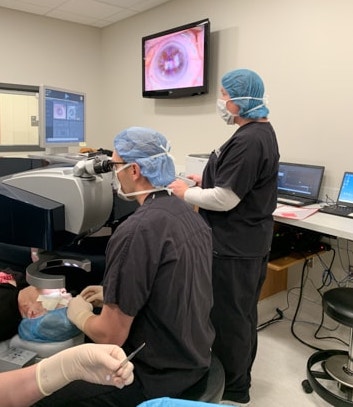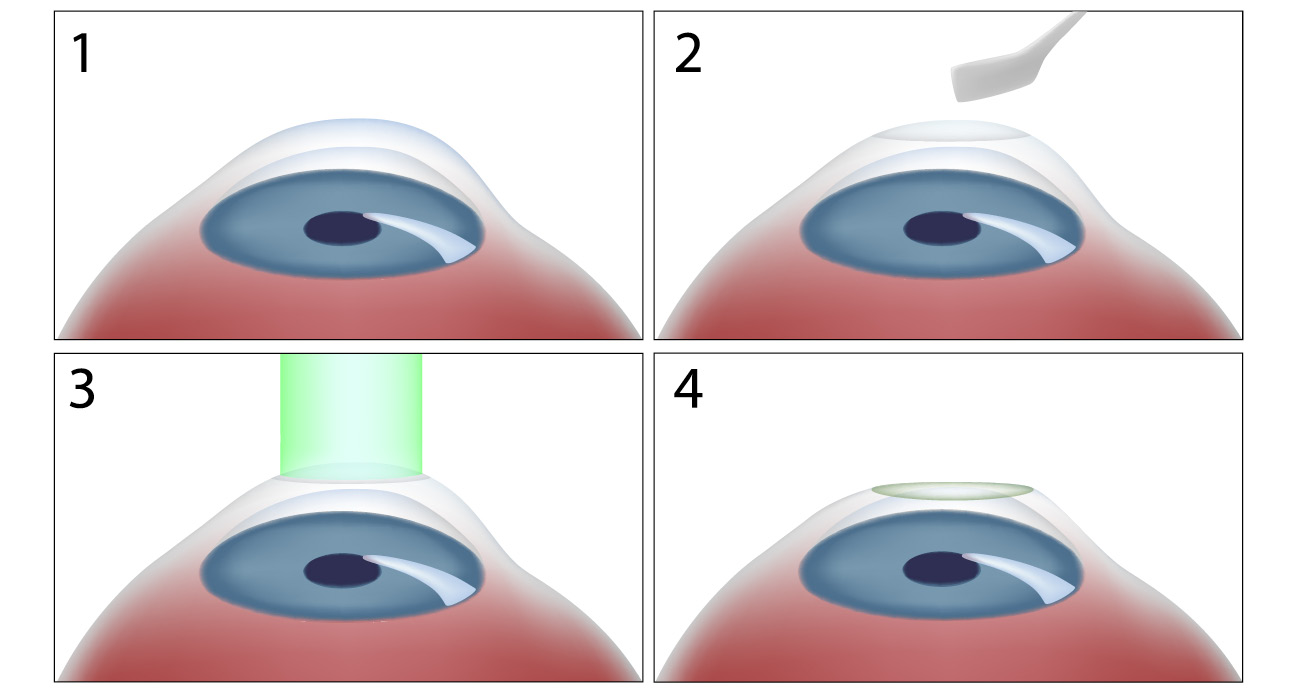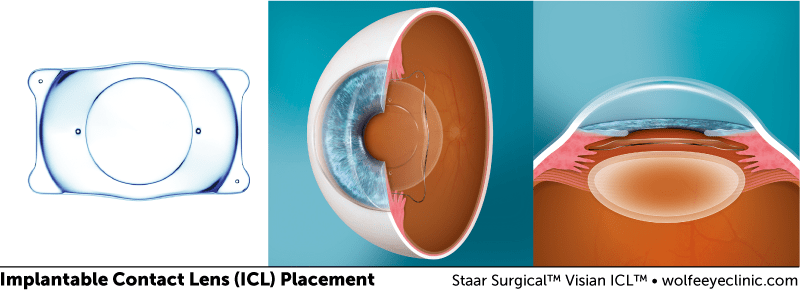LASIK Corrective Eye Surgery Alternatives
At Wolfe Eye Clinic, we know every set of eyes is unique. That’s why our expert team takes the time to evaluate whether LASIK is right for you, or if an alternative option might be a better fit for your vision needs.
 LASIK is a well-established corrective eye surgery that reshapes the cornea so light focuses correctly on the retina. It’s commonly used to treat nearsightedness, farsightedness and astigmatism, often reducing or eliminating the need for glasses or contact lenses.
LASIK is a well-established corrective eye surgery that reshapes the cornea so light focuses correctly on the retina. It’s commonly used to treat nearsightedness, farsightedness and astigmatism, often reducing or eliminating the need for glasses or contact lenses.
However, LASIK may not be right for everyone. Our experienced surgeons specialize in a full range of advanced refractive procedures and offer alternatives like monovision strategies, photorefractive keratectomy (PRK) and implantable contact lenses (EVO ICL). At Wolf Eye Clinic we are committed to helping you understand your options and find the best eye correction solution for clear, lasting vision.
Monovision LASIK Eye Surgery
Unfortunately, as we age, so do our eyes. By the time we reach our early 40s, many of us will typically experience presbyopia, the normal loss of near focusing, which can increase the need for reading glasses or bifocals. Monovision LASIK reduces the reliance on reading glasses, allowing you to enjoy greater freedom in your day-to-day life, whether that’s reading a menu, checking a phone or driving. During your LASIK consultation, your surgeon will review your vision needs, lifestyle and treatment goals to determine if monovision LASIK is the right solution for you.
What is Monovision LASIK Eye Surgery?
This specialized procedure corrects one eye for distance vision and the other for near vision, reducing the need for reading glasses as you age. Instead of correcting both eyes for distance, one eye is adjusted for far vision while the other is fine-tuned for close-up tasks, giving the brain a blended range of vision.
In order to move forward with monovision LASIK, patients generally first mimic the effects of monovision by trialing monovision contact lenses. This trial period not only tests whether the eyes’ communication with the brain can adjust accordingly, but also identifies if patients experience unwanted side effects. Most patients will know within a couple days if monovision LASIK is right for them based on the contact lens trial.
Monovision LASIK vs Traditional LASIK
While traditional LASIK prioritizes sharp vision at one range, Monovision LASIK balances near and far focus, making it a strong option for patients managing presbyopia. Traditional LASIK corrects both eyes for clear distance vision, often leaving patients over 40 still dependent on reading glasses for close-up tasks. Monovision LASIK, on the other hand, intentionally corrects one eye for distance and the other for near vision, helping to reduce reliance on glasses for reading or other everyday tasks.
Photorefractive Keratectomy (PRK)
PRK, an FDA-approved alternative to LASIK, may be right for you if you experience thin corneas, chronic dry eyes or lead an active lifestyle. This corrective eye surgery is commonly used to correct nearsightedness, farsightedness and astigmatism, leading to long term clear and lasting vision.
What is a Photorefractive Keratectomy (PRK)?
This procedure provides long-term visual clarity while preserving more of the cornea’s structural integrity. PRK reshapes the surface of the cornea after gently removing its thin outer layer. As the eye heals, new surface cells naturally regenerate, leading to improved vision.

Photorefractive Keratectomy (PRK) vs LASIK
This surgery uses the same trusted excimer laser technology as LASIK, but applied differently to achieve vision correction. While recovery takes a little longer, PRK can provide the same long-lasting vision improvement as LASIK, and may be a better choice if you have thinner corneas, dry eyes or an active lifestyle.
Implantable Collamer Lens (EVO ICL)
Implantable Collamer Lenses is a safe and effective corrective eye surgery option for those who may not qualify for LASIK or PRK. Unlike procedures that reshape the cornea, EVO ICL implants work from inside the eye, making them an excellent solution for people with very high prescriptions, thin corneas or chronic dry eye. For long-lasting results without altering corneal tissue, EVO ICL surgery offers a dependable alternative with the added benefit of being removable, if needed.
What is an Implantable Collamer Lens (EVO ICL)?
An EVO ICL is a clear, flexible lens placed inside the eye, just behind the iris and in front of the natural lens, to correct vision without altering the cornea. EVO ICL implants correct vision similarly to that of a contact lens by adjusting the way in which the eye refracts light, providing sharp, high-quality vision that feels natural, making it a safe and effective option for patients with high prescriptions, thin corneas or dry eyes.
As with any surgery, there are risks including halo or glare around lights, corneal swelling, increased eye pressure, and cataract development. Your surgeon will review additional possible side effects with you and whether you may be a good candidate for implantable collamer lenses.

Implantable Collamer Lens (EVO ICL) vs LASIK
EVO ICL corrects vision by placing a thin lens inside the eye, without removing corneal tissue. LASIK, on the other hand, reshapes the cornea with a laser to improve vision. While LASIK typically offers quicker recovery, EVO ICL provides reversible, long-term correction with excellent visual quality.
Refractive Lens Exchange Surgery (RLE)
If you are experiencing presbyopia, the normal loss of near focusing due to aging eyes, Refractive Lens Exchange (RLE) might be the right fit for your vision needs. This procedure replaces your aging lens, correcting nearsightedness, farsightedness and astigmatism. RLE also eliminates the need for future cataract surgery. Your refractive surgeon will review with you additional possible side effects and your potential candidacy for RLE.
What is a Refractive Lens Exchange Surgery (RLE)?
In this corrective eye surgery, the eye’s natural lens is replaced with an artificial lens to correct vision. Similar to cataract surgery, this approach is especially effective for those with presbyopia or high prescriptions not suited for LASIK or PRK. By replacing the natural lens, RLE provides clear vision at multiple distances, reduces reliance on glasses or contacts and prevents cataracts from developing in the future.
Refractive Lens Exchange Surgery (RLE) vs LASIK
While LASIK reshapes the cornea with a laser, RLE corrects vision by replacing the eye’s natural lens with an artificial lens. Unlike LASIK, RLE prevents cataracts from developing in the future, offering both vision correction and long-term eye health benefits.
Still Not Sure Which Best Eye Correction Procedure Is Right For You?
To find out if you are a candidate for LASIK or alternative corrective eye surgery options, please call one of our LASIK Coordinators at (833) 532-8809 or schedule a free LASIK consultation.
Wolfe Eye Clinic has experienced LASIK refractive surgeons across the state. We offer free LASIK consultations at our Ames, Ankeny, Cedar Falls, Cedar Rapids (Hiawatha), Des Moines, Fort Dodge, Iowa City, Marshalltown, Ottumwa, Pleasant Hill and Waterloo clinics.